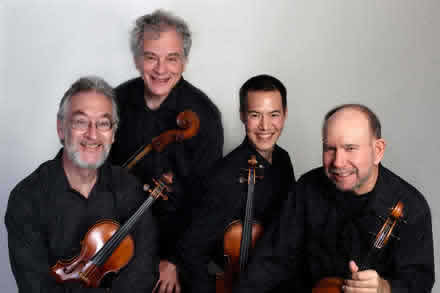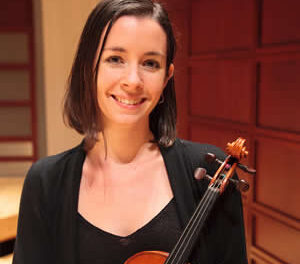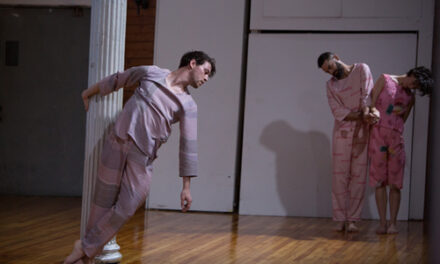Whether it is the descriptor of a musical group, or it appears on someone’s resume, the name “Juilliard” has come to mean excellence of the highest order and also carries with it the weight of playing up to that standard. No group better personifies those qualities than the Juilliard String Quartet, formed in 1946 at that well-known music conservatory in New York City. The Raleigh Chamber Music Guild closed out their 2010-11 Masters Series with this grandmaster of string quartets at the intimate and lovely Fletcher Theater of the Progress Energy Center for the Performing Arts in downtown Raleigh.
For a group that has been performing for 65 years, the Juilliard Quartet has gone through relatively few personnel changes. Most noticeably this year is the appointment of Joseph Lin not only as their new first violinist, but also to the faculty of the Juilliard School. Rounding out the rest of the quartet is Ronald Copes, second violin; Samuel Rhodes, viola (since 1969); and Joel Krosnick, cello (since 1974).
This afternoon’s program was a wonderful mix of big name composers, but works with varying degrees of airtime. The afternoon began with a perplexingly rare performance of Schubert’s Quartet in G minor, D. 173. Unlike Beethoven’s sixteen string quartets which all more or less are given equal exposure, many of the fifteen surviving quartets of Schubert remain in the wings while “Death and the Maiden, ” “Rosamunde” and his final, epic G major quartet get most of the spotlight. This is unfortunate since this early work written in eight days in 1815 is a wonderful “discovery” and every bit as mature as his later works. The andantino movement is one of those remarkable Schubert creations that makes you wonder how a melody so simple can be so beautiful and yet has not been previously realized. For those who were watching the “new, young kid” and trying to discern his musicianship and how he fit in, it was apparent that Joseph Lin is a violinist of unerring technique, exquisite tone and sensitive phrasing, who is also an effective leader of his vastly more experienced band mates.
Well before the six Bartók string quartets became as commonplace as Mozart, Beethoven or Haydn for any viable quartet, the Juilliard Quartet was programming and championing them in the early 1950s and even won a Grammy in 1966 for their recording of all six. Today they performed Bartók’s third, the shortest of the six, lasting only about 15 minutes and played in one continuous movement. The mood begins bleakly but eventually rises to a folk-like exposition of such explosive energy that you are surprised that their wooden boxes will remain intact. This is a fantastic microcosm of all of Bartók’s styles and effects, leaving you breathless and incredulous at the conclusion. While watching the musicians play, and then closing my eyes, it was interesting to compare them with their much more effusive string quartet colleagues. The players appeared reserved, almost complacent and withdrawn, yet what we hear is phenomenal emotion, energy and insight into the music. There is no grunting, groaning, flailing, foot-stomping, legs flying, and exaggerated physical manifestations that have seemed to become standard practice. It was nice for a change to actually hear the music without being forced to also watch an aerobics class.
I didn’t always buy into the conventional wisdom that there is some music that requires a certain level of maturity and life experiences to effectively play well – that is until today. Beethoven’s 15th string quartet, Op. 132 in A minor, was written in 1825 and is well known for having the nickname “Heiliger Dankgesang,“ which indicates a song of thanks for his recovery from a serious illness. This was added as a fifth movement and placed in the middle of the work with all the gravitas implicit from the composer’s deafness, financial woes and mortality. This is one of those compositions that seem to balance on the edge of foreboding and despair, even in movements that outwardly seem light and joyous. It would be great music even played at that surface level, but when the Juilliard Quartet spoke they delved deeply into the ambivalence, pain and struggle that is life itself.













